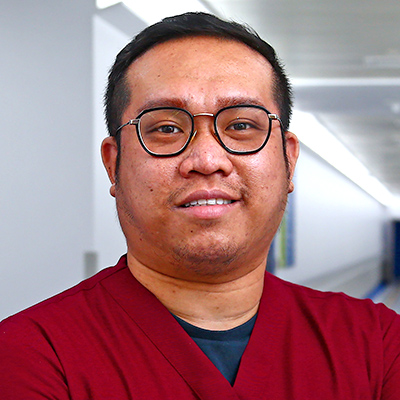

Nurse from the Emergency Department, Rashid Hospital
Suchitra Bajpai Chaudhary | Chief Reporter
Nurses are at the heart of healthcare systems. Since they constitute a majority of the care providers in any health system, they were on the frontline when COVID-19 rampaged around the world. Nurses risked coronavirus infections to treat COVID patients, often working 12 hours or more.
Aodh Mathew Campos Heule, a male nurse from the Emergency Department at Rashid Hospital, Dubai, says the fear of contracting the disease didn’t prevent nurses from doing their duty. “The fear of being infected and the risk of turning into patients ourselves has always been there. However, we dealt with it with a strong mind and by taking precautions. We never let this fear come in the way of our service. We continued to offer care to every patient,” he said, adding that their role has been refined and adjusted according to the needs of patients.
According to Heule, the key to winning the COVID-19 battle in Dubai was efficient administration and teamwork at Rashid Hospital. “Patient management was very important to us. To win this battle, we needed the help of the UAE government, the administration and the emergency department at Rashid Hospital and other UAE hospitals as well,” he said.
How Rashid Hospital rose to the challenge
“Following the directives from health authorities, Rashid Hospital made structural and management changes to adapt to the situation. We converted psychiatric units into isolation rooms; some wards were transformed into Intensive Care Units (ICU). In the Emergency Department, under the leadership of Dr Sarah Kazim, we constructed isolation and Intensive Care Resuscitation area for patients who required immediate nursing and medical management,” Heule added.
The International Hospital Federation commended Rashid Hospital’s efforts in tackling the COVID challenges. The Dubai government healthcare facility was the first in the UAE and the GCC to ramp up measures to anticipate an influx of COVID patients. The Emergency Department, which had 68 beds, increased the capacity by nearly three times to 158, besides setting up 131 new intensive care beds. The number of beds in negative pressure rooms (to control infection) was raised to 402 from 22. Specific medical equipment, including 786 infusion pumps, 131 ventilators and heart monitors, were acquired to manage COVID.
Rashid Hospital was also quick to increase the medical staff strength by hiring 14 doctors and 320 nurses. Physicians were also trained on progressive oxygen therapy to reduce the need for ventilators. A plasma donation clinic was established on the premises so that recovered patients could donate their plasma rich in antibodies to counter COVID-19.
Making peace with the crisis
The medical staff too quickly adapted to the unfolding crisis and made the necessary adjustments to handle the stress. “We made every effort to avoid carrying the stress from work to our homes. At home, I would devote my energy to cooking, baking, and planning my day. My colleagues too used this diversionary tactic by setting aside negative thoughts and worries to focus on spending quality time with their families at home. Some played online games and did other activities to reduce the stress,” Heule said.
The ABC of survival
Heule listed three core principles that helped nurses cope with the pandemic. These are the ‘ABCs’:
A — Adapt to changes quickly. Change is the only constant in our lives. So, the best way to cope is to adapt. Adapting to the changing environment is key to better patient care and management and essential to avoid negativity.
B — Be healthy. Avoid vices. Eat healthy food and in moderation to get through the crisis.
C — Care is the core of nursing. “We nurses love life and fight for our patients’ lives as well. No matter how stressful or exhausting our work may be, at the end of the day, there is a sense of fulfilment when a nurse goes back home with the knowledge that a life has been saved or a sick patient’s mood has been lifted,” Heule added.
Aodh Mathew Campos Heule, Nurse, Emergency Department, Rashid Hospital